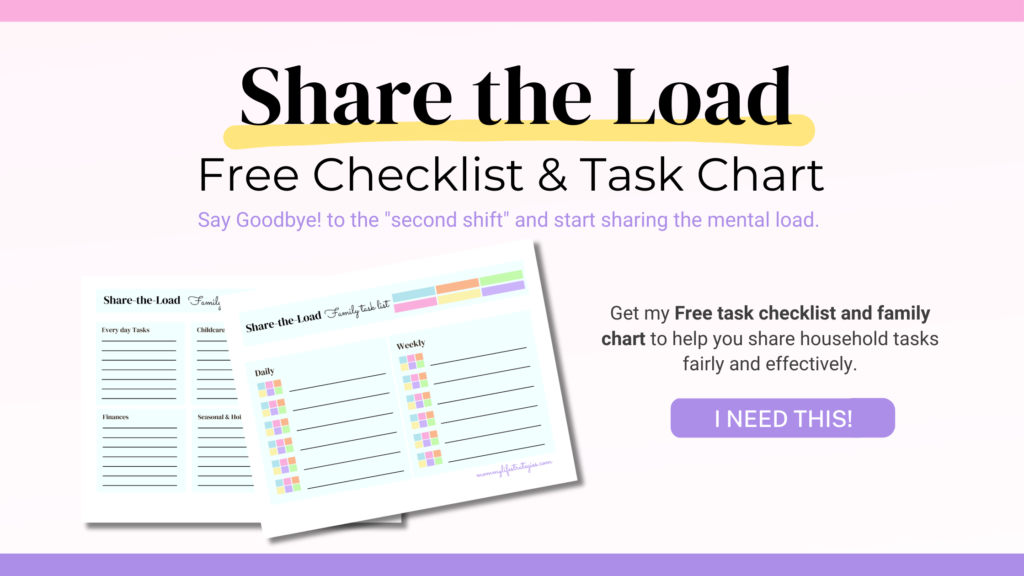
The mental load is the invisible labor or “worry work” that moms face every day. Housework, errands, and childcare are continuously spinning around in your mind and it’s exhausting.
If you’re a mom who’s feeling overwhelmed by this mental load, you’re not alone! This is a common and very real problem that can rob you of an enjoyable motherhood experience.
The good news? There are strategies to help you reduce and share the mental work and it begins with having open conversations with your spouse and asking for help. Let’s get started.
Disclosure:Some of the links below are affiliate links. As an Amazon Associate, I earn from qualifying purchases. That means that, at no extra cost to you, I will earn an affiliate commission. Learn more about it on my disclaimer page.
Don’t just share the mental load, reduce it! Here are 7 ways to lighten your load that works to free up your mental energy so you can stop being overwhelmed and stressed out.
Communication is Key
It’s important to understand first that communication is key. Don’t just let it go and build resentment. Speak up. But there’s a good way and bad way to communicate.
I’m going to share with you how to communicate effectively so your partner/spouse understands you.
The next step is to prepare. The mental load isn’t merely about the number of tasks you’re managing, but it’s about constantly remembering, organizing, and planning these tasks. It’s the running list in your mind of what needs to be done and when.
It’s an exhausting job that often goes unseen and unrecognized. But it’s real, and it matters. Write down all the things on your mind that are draining you so you can share your concerns in the conversation with specific examples.
You might be thinking, “How do I bring this up to my spouse?” I understand. It’s uncomfortable, but if you don’t communicate you can’t overcome this problem. It is also likely that your spouse has no clue that you are struggling. You don’t know unless you talk about it.
Recommended: Systems to share the mental load
“The result is Fair Play: a time- and anxiety-saving system that offers couples a completely new way to divvy up domestic responsibilities. Rodsky interviewed more than five hundred men and women from all walks of life to figure out what the invisible work in a family actually entails and how to get it all done efficiently. With 4 easy-to-follow rules, 100 household tasks, and a series of conversation starters for you and your partner, Fair Play helps you prioritize what’s important to your family and who should take the lead on every chore, from laundry to homework to dinner.”
How to approach your spouse about mental load
Pick a time when you’re both relaxed
Find a moment when you both have the time and the mental space for a conversation. This conversation deserves its own time and space, so it won’t be effective if you’re trying to discuss the matter in the heat of the moment. Nor will it be if you are dropping subtle hints. Both you and your spouse can have this discussion with a level head and be heard more clearly.
Speak from your perspective
Express your feelings using “I” statements. It’s not about blame but about how you’re feeling. Start with something like, “I often feel overwhelmed by remembering all the things that need to be done…”
If you were to approach the discussion with “You do (X)…” or “You make me feel (Y)…”, your spouse will likely feel they are being attacked and will immediately put up their guard. The problem with this is that it will make the discussion much harder to communicate and your concerns heard. It is also likely that you will not reach an agreement on the matter.
Be specific
Being specific will be helpful to you and your partner. Describe specific cases where you feel the mental load is heavy. Maybe it’s when you’re at work, but your mind is occupied with remembering the grocery list, or when you’re enjoying a rare moment of relaxation but are worried about your child’s upcoming parent-teacher meeting.
Explain the impact
Discuss how this overload is affecting you. Whether it’s causing stress, making you lose sleep, or limiting your personal time, it’s important that your spouse understands the impact of the mental load on your well-being.
Ask for help
Explicitly ask for help. It’s not about asking them to “help you out” but about sharing the mental load fairly. This might mean not just executing tasks, but also remembering and planning them.
Remember, this conversation is a starting point. It won’t magically solve the problem but it’s a starting point that leads to better awareness and understanding of the problem. This is much better than trying to deal with it and harboring resentment as a result.
Don’t just share the mental load, reduce it! Here are 7 ways to lighten your load that works to free up your mental energy so you can stop being overwhelmed and stressed out.
How to encourage your spouse to be involved
Encourage your spouse to take an active role in sharing the mental load. Here’s how you can do it:
Create a shared list together
One of the ways to encourage sharing the mental load is to keep track of what needs to be done.
To make your own list, break down tasks by daily, weekly, monthly, and yearly. When you write your list don’t think of every chore you can possibly do. Prioritizing the most important tasks is best.
Your shared list will include all the tasks you already do and must do every day, weekly or monthly.
Yearly will be for tasks and activities you typically do less frequently but are still important like holidays, birthdays, and/or travel.
If you want to make this easier, download my free share-the-load checklist and task chart.
Encourage your spouse to take the initiative. If your spouse is used to you taking over on most of the tasks, it will take some adjustment for them to go out of their way to proactively tackle domestic duties.
He can refer to the task list and/or check the family calendar to see what needs to be done.
Divide household responsibilities fairly
Set up a shared calendar for important dates and tasks, meal planning together, or alternating responsibilities like grocery shopping or morning routines with kids.
Look for ways to outsource tasks as much as possible. There are many services and technology that you can use to free up your time and energy.
Consider timing when deciding on who takes over what task and align them with your work schedules.
For example, if your spouse finishes work earlier than you, he can be the one to pick up the kids and get dinner started. If you arrive home from work later, you can load the dishwasher and pack the kids’ lunches.
If either of you are stay-at-home parents, the working parent can help in the morning before heading out to work like taking out the trash, checking the family schedule for upcoming appointments, and helping the kids get ready for school.
Each family is different and so will their needs. Choose to divvy up tasks according to your needs, routine, and schedule.
Keep track of what needs to be done
Instead of waiting to be asked, they should try to proactively notice when things need to be done, like when groceries are running low or when laundry needs to be folded. Tracking can be made easier with daily, weekly, and monthly task lists or charts like the one I created here.
You and your family can take a glance at what’s left to do and take action without being asked.
Create a supportive environment
Acknowledge each other’s efforts, be supportive, and understand that sharing the mental load will look different for each family. It doesn’t have to be an even split but a fair division of your most frequent and important tasks.
The goal should be that everyone contributes to maintaining a home and only for the things that matter most.
Remember, sharing the mental load does not need to be an even split of tasks between you and your spouse. You both decide what makes more sense for the both of you.
Like any good team, both players need to play together to win the game. It might be a challenge at first, but working towards sharing the mental load can lead to a happier, healthier, and more harmonious family life. Start that conversation and take the steps to fairly share tasks so that you can finally say goodbye to the overwhelming mental load.



